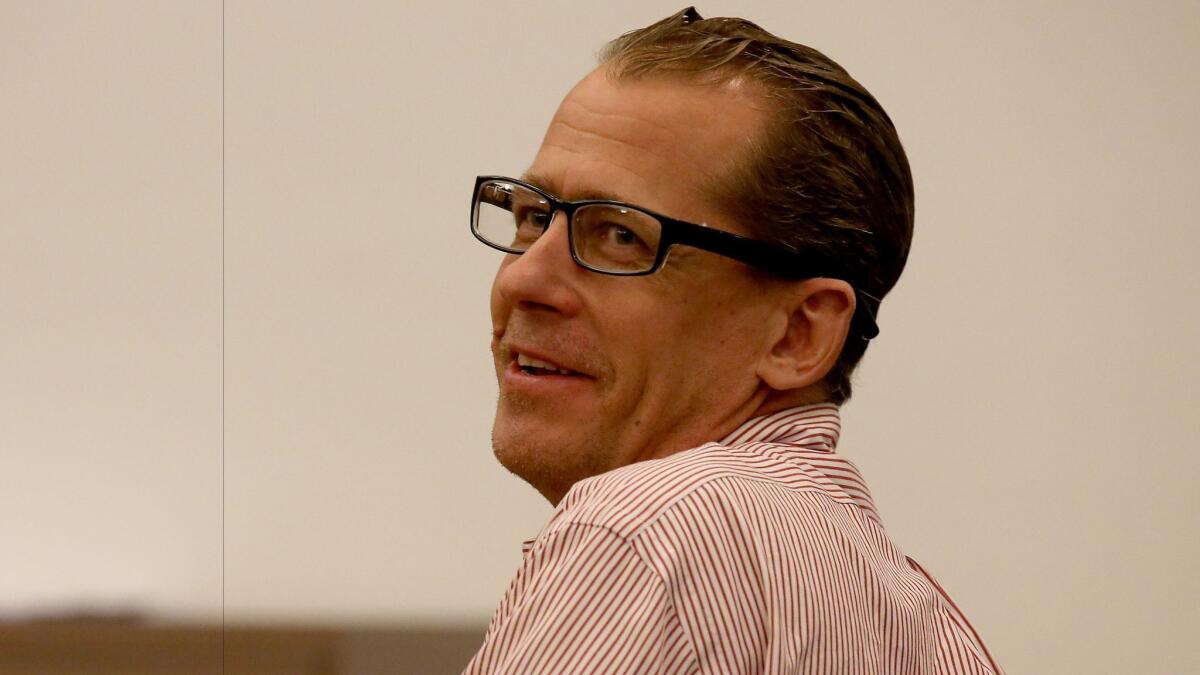Jury votes for death penalty for parolee who killed four women in Orange County

- Share via
An Orange County jury on Wednesday decided a serial killer should be executed for the abduction and murder of four women.
Representing himself at his trial in Santa Ana, Steven Dean Gordon did not dispute his responsibility for the deaths of the women, who had been working as prostitutes in Anaheim and Santa Ana in late 2013 and early 2014.
Nor in his closing argument to jurors Tuesday did Gordon, 47, disagree with a prosecutor’s argument that he ought to be executed for his crimes.
“If you kill four people like this in cold blood, you deserve to die — I believe that,” Gordon told jurors. “My actions were evil and horrible, and you’re gonna get your justice very shortly.”
He said he was sorry to have caused pain to the families of Kianna Jackson, 20; Josephine Vargas, 34; Martha Anaya, 27; and Jarrae Estepp, 21 — the women he was convicted last week of killing.
Gordon told jurors he had to fire his public defender because she would not let him plead guilty and he wanted to speed the case along. He also said he had to take the case to trial because defendants representing themselves cannot plead guilty in capital cases under the law.
Prosecutor Larry Yellin told jurors to think of the terror Gordon and his co-defendant Franc Cano, who is expected to be tried next year, inflicted on the victims.
Yellin described the men — who had been registered sex offenders wearing ankle monitors during the period of the killings — as “two incredibly sadistic, cruel, vile people” brought together by “the strangest and wrongest happenstance.”
During his trial, Gordon raged against his former parole and probation agents, saying that if they had watched him properly they would not have allowed him to associate with Cano and the victims would be alive.
Gordon also railed against Cano, calling him “that little bastard” and blaming him for certain acts of violence. He said Cano had bitten Estepp and stomped on her neck to ensure she was dead.
Estepp’s body was found at an Anaheim recycling plant in March 2014. The other victims’ bodies have never been found.
Jurors deliberated for about a day before deciding that Gordon, who had prior convictions for molesting a relative and kidnapping his former wife, should be executed.
During the penalty phase of the trial, which began Monday, the prosecutor called the four victims’ mothers to the stand. They spoke of how close they had been to their daughters.
“She was always with me. She was my best friend,” said Vargas’ mother, Priscilla Vargas. “She would always call me in the morning to make sure I had my Coca-Cola, because I drink a lot of Coca-Cola.”
Anaya’s mother, Herlinda Salcedo, described her panic when her daughter vanished in November 2013. She said she urged police to investigate, convinced her daughter would not just abandon her own preschool-age daughter.
“She was so responsible,” Salcedo said.
After her daughter disappeared, Salcedo said, she passed out fliers, walked among hotels in Santa Ana looking for clues and wrote down the license plates of suspicious vehicles. “We were looking for her for almost six months,” Salcedo said.
When police informed her that her daughter had been killed, Salcedo held a memorial service at the trash bin where Gordon said he had dumped the body.
Gordon chose not to cross-examine the mothers during the penalty phase. When he got a chance to present his defense, he told the jurors that they had “done the right thing” by convicting him. He presented testimony that he was from a broken home and had been molested as a child.
But he did not ask jurors to spare him. He said he hoped when a jury assembles to weigh Cano’s fate, it votes to put him on death row as well.
Referring to what he called their “killing spree,” Gordon told jurors: “There is no defense for what me and him did. Absolutely none. It’s despicable and disgusting.”
Orange County Superior Court Judge Patrick Donahue is expected to sentence Gordon on Feb. 3.
At one point Wednesday, the jury had seemed to be at an impasse after one member said she could not vote for the death penalty. Gordon asked to have her thrown off the panel, but she was allowed to stay, and soon cast her vote for death.
“I don’t think there was ever a case that has taken as many strange turns from beginning to end,” Yellin said. Among the bizarre twists: Gordon fought successfully to suppress his 13-hour videotaped confession on Miranda grounds before trial, only to insist on playing it for jurors himself. He also volunteered to give another taped confession.
Among court watchers, there was widespread suspicion that Gordon had chosen to represent himself as a way of tormenting his victims’ families. Yellin saw a different motive. “He’s very controlling,” the prosecutor said. “He wanted the trial to be on his own terms.”
ALSO
Death toll rises to 32 in Mexico fireworks blast and the cause remains a mystery
A red swastika and a racist note: Police investigate possible hate crime in Montrose
UPDATES:
6:25 p.m.: This article was updated with comments from the prosecutor.
5:45 p.m.: This article was updated with additional details from the trial and the testimony from victims’ relatives.
This article was originally published at 4:10 p.m.
More to Read
Sign up for Essential California
The most important California stories and recommendations in your inbox every morning.
You may occasionally receive promotional content from the Los Angeles Times.










